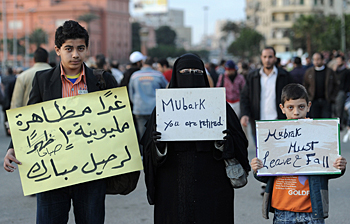Egypt and the End of Excuses for the U.S.
The Daily Beast |

By Parag Khanna
The ouster of President Hosni Mubarak will not set off a domino effect in the region, Parag Khanna says. But the revolt in Egypt clearly shows the U.S. should back the promise of the Egypt’s next generation.
If there is any silver-lining from the inevitable fall of the Mubarak regime in Egypt, it should be that so many of the so-called rules governing Western thinking about the Middle East can be jettisoned as well.
Egypt was such a reliable intellectual anchor for those who didn’t get the rapidly changing landscape of power and influence in new Middle East. Clichés dominated about Egypt being the “pillar of Arab stability” and “Arab world’s bell-weather towards Israel.” A corollary to these tropes was that we must prize stability over democracy with allies as important as Egypt and Saudi Arabia. These all now sound like pathetic excuses justifying inertia and lack of creativity.
Despite all the drama in Egypt and murmurs of similar uprisings percolating from Yemen to Jordan, all Arab regimes are not going to fall in Middle Eastern version of Eastern Europe’s 1989. The Persian Gulf monarchies, for example, are wealthier and more powerful, with less organized opposition. They are in many ways the new power center of the Arab world, having left stagnant Egypt behind years ago. We need to now have a much more subtle appreciation of which Arab states uses their natural resources well and poorly, which ones are forging strong relationships with China and Europe to hedge against our intrusions, and which ones are attempting to achieve genuine domestic stability through job creation and including their large foreign-born labor populations as stakeholders even if they are not citizens.
The fall of the Egypt frozen by decades of stale authoritarianism awakens us to the possibility of a new Arabism. Nasser and Mubarak’s Egypt was the follower-less leader of the old Arabism of anti-colonial rhetoric and failed Sunni unity. The new Arabism is about Qatar’s Al Jazeera satellite TV channel, Lebanese bloggers, and Dubai-based investors. It is their entrepreneurship, know-how, and capital which are re-shaping the vast young Arab generation’s outlook on the world. This is the kind of fresh, young secular Arabism the West should get behind—liberating them from the squeeze between autocrats and would-be theocrats.
How much expertise does it take to observe materially shifting ground realities before our eyes, or to apply simple cost-benefit analysis, or to consider long-term horizons over short-term benefits?
We haven’t reached the end of history where all societies ultimately gravitate towards a Western model. To the contrary, the spread of power around the world is enabling new models like authoritarian state capitalism to rise up and challenge the West. Even poorer societies increasingly speak the language of good governance—accountability, service delivery, ease of business—but not democracy. Get ready for a world of subtlety where the rules change at each place on the map, where networking with locals gets you much further than international laws and treaties, and where the difference between the word alliance and dalliance is just one letter.
Never again should we listen to platitudes about prizing autocratic “stability” over democratic “chaos,” even if such grand-sounding doctrines are cloaked in Kissingerian accents. Nietzche once said he could only believe in a God who knows how to dance. We should only listen to experts who travel and speak foreign languages, who appreciate the subtleties of the new currents shaping one of the world’s most strategic regions.
Parag Khanna is a Senior Research Fellow in the American Strategy Program at the New America Foundation and author of the new book How to Run the World: Charting a Course to the Next Renaissance (Random House). He has written for the New York Times, Financial Times, Foreign Policy, and many other publications, and frequently appears on CNN, BBC, PBS, and NPR radio.